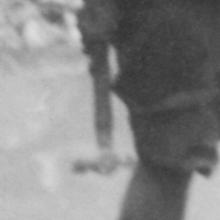Today sees the first visit by representatives of the International Committee of the Red Cross, Edouard Egle and Rudolf Zindel. Egle arrived from Shanghai yesterday to help Zindel set up a Hong Kong Delegation.
Egle's report is controversial:
The camp indeed looks more like a summer colony than an internment camp. Mr. Zindel and I were there for about three hours and were left absolutely free to move amongst the prisoners and converse with them. I did not see a single sentry inside the camp, internees appeared to have complete freedom, some played lawnballs (sic), others had a sun bath, practically all looked in perfect health, internees have permission for swimming, the canteen seemed well stocked, internees receive a liberal supply of food and comfort parcels....
Some people of course have to grumble, I must say the number of such were very few. It is true that the majority of the internees probably lost weight, but this is not due entirely to lack of juicy beefsteaks and other luxuries. The healthiest person person who goes in for sun bathing, tanning the skin, a lot of physical exercise etc. will lose weight, but that by no means indicates that his health is impaired, rather than the contrary. For instance, Mr. Allman looked 10 years younger, he had such a healthy complexion and happy round face that I first failed to recognise him.
For some reason Zindel doesn't send Geneva his reports on Stanley and the POW Camps until December - he blames pressure of work, but this is unconvincing as the two documents total only seven pages. In a decsription based on today's visit and a second one Mr. Maijima on July 18, he too will give a rosy picture of Stanley conditions:
There is plenty of open space and, under different circusmtances, the locality and its facilities, could without exaggeration be called "ideal". There are Sports-Grounds available, as well as one of the best beaches in Hongkong.
He notes that during tdoday's visit the Americans, who are preparing for repatriation, are in high spirits, while the British are understandably dis-spirited at having to stay behind. He continues:
I was informed by trustworthy parties that the food position was not altogther adequate during February/March/April, but that there had been steady improvement later, so much so that at the time of our visits, the majority of the persons interviewed were prepared to state that they were satisfied with present conditions.
Zindel points out that since mid-April the internees have been allowed to receive two parcels a week from friends and relatives in town - a useful supplement to the rations, for some at least.
These reports were no doubt too favourable, but they do reflect the fact that things in Stanley are much better now than in the first three months and, with the Americans about to leave and free up some of the best accommodation in camp, Stanley is on the brink of its 'golden age' - or, to put it more realistically, things are about to be as good as they'll ever be.
In any case, Zindel is in an impossible position: if he tells the truth about the camps, the Japanese, who read all his reports and other correspondence, will at the very least censor the critical passages out, and will probably end his mission and perhaps even imprison him (Red Cross work gathering information for the outside world about prisoners, internees and casualties looks rather like spying to them anyway, so they wouldn't have to go far for an excuse). But if, as in fact happens, he chooses to give an idealised picture of life in the camps, he will be accused of inaccuracy and bias in their favour.
In my view, his cautious approach in this and other matters is justified by the outcome: in mid-August 1945, the time of the Japanese surrender, Rudolf Zindel - having been almost arrested in May 1943 and currently on a Japanese 'hit list' - is still free in Hong Kong and giving out aid to the needy.
Driver Thomas McMaster dies in Shamshuipo, the first recorded casualty of a diphtheria epidemic that will claim many lives through the rest of 1942. A dreadful period is beginning, and the POW doctors are going to find it hard to get hold of the medication that can save any sufferer if administered in time. But if the Japanese authorities are obstructive, one man at least thinks differently: the interpreter Kiyoshi Watanabe will risk his life smuggling serum and other medical supplies into Shamshuipo.
Sources:
Egle and Zindel - three sources:
Report by Mr. Egle, 7 August 1942 in Archives of the International Committee of the Red Cross (Geneva), BG17-07-062, Prisoners in Hong Kong 1942-August 1943 (G17/H.K.)
Rudolf Zindel Interim Report On Visits To Stanley Internment Camp, in Archives of the International Committee of the Red Cross (Geneva), BG17-07-061
Extract from Revue International de Croix Rouge, 1943, in Hong Kong Public Records Office, HKMS100-1-8
McMaster: Tony Banham, We Shall Suffer There, 2009, Saturday 27 June, 1942
Note: One historian has suggested that the apparent nonsense Egle wrote about the reasons for the internees losing weight was an elaborate subterfuge to get the Japanese to allow his report through uncensored - his only real point was 'they're losing weight' and the recipients in Geneva would understand that this was because rations were inadequate. I have yet to make up my mind about this possibility!

